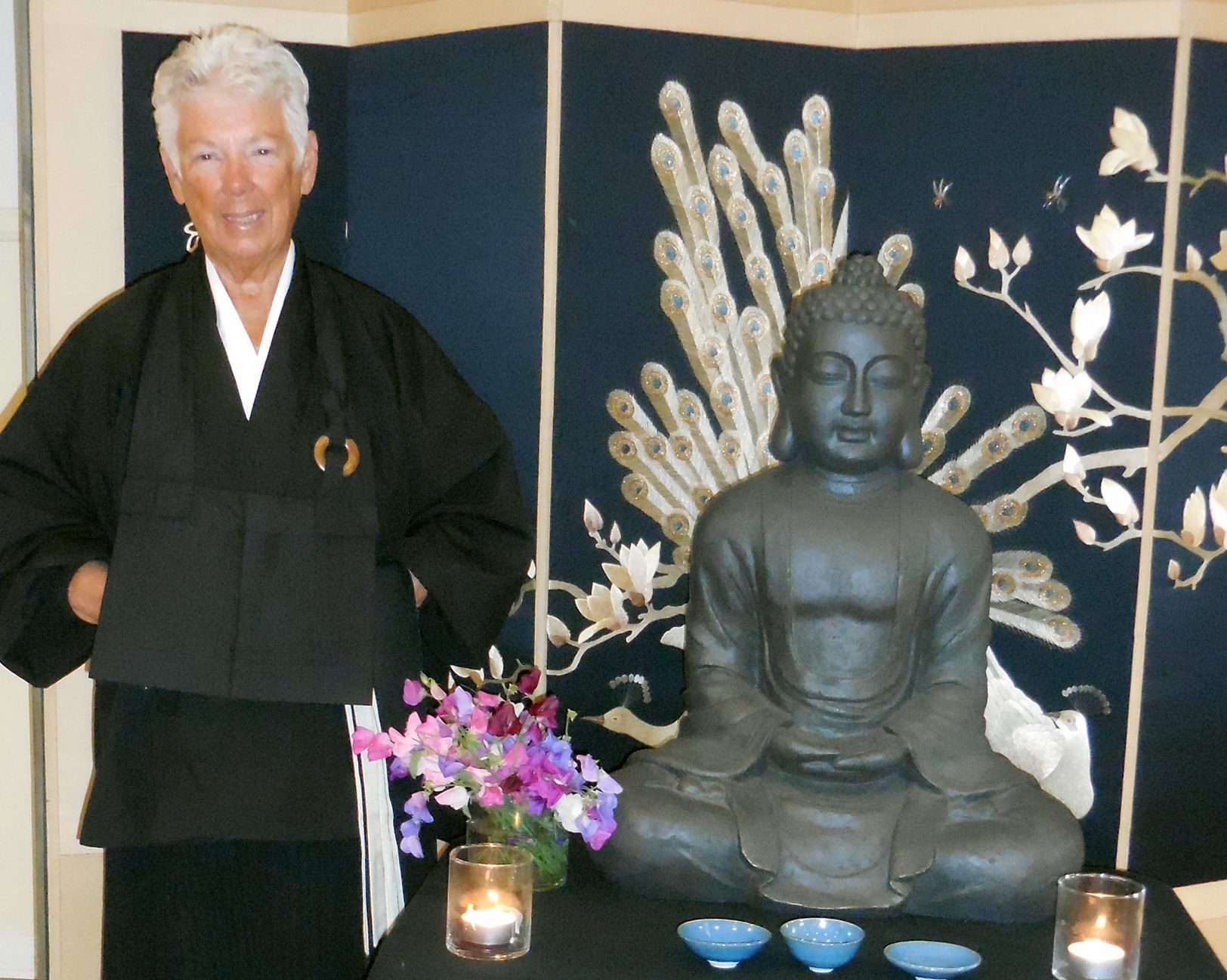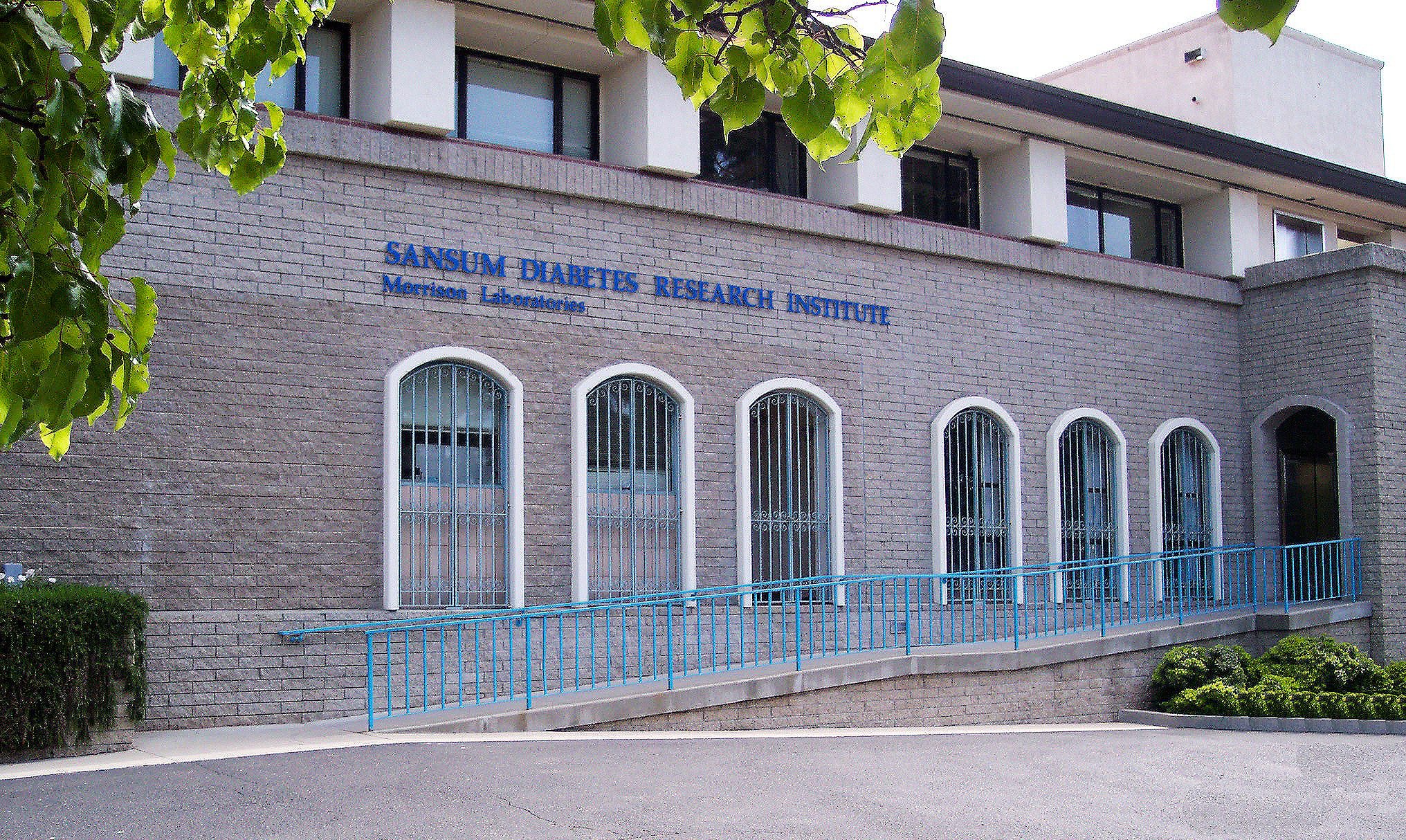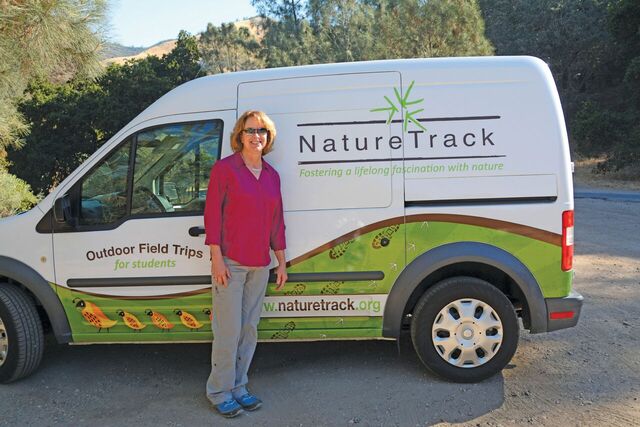By Pamela Dozois
Contributing Writer
After nearly 60 years of spiritual dedication, devotion and study, Carol Abrahamson is the Santa Ynez Valley’s first Soto Zen priest and one of the first women to be ordained in what historically has been a male-dominated community.
She was ordained in 2016 at the Santa Barbara Zen Center by Sensei Gary Koan Janka, head teacher and officiating priest at the center, who remains her teacher and friend.
“It is a great honor to have such a wise and learned teacher in our midst. She is a valley treasure,” said Sandra Mastromonaco, a board member and participant in the local sangha, a meditation group.
“You don’t just say ‘I want to be a Zen priest,’ you have to be invited, and it takes many years of study, dedication, and practice to become one,” Abrahamson said. “And then the study and practice continues. I won’t get through all the levels in this lifetime. I will be 80 years old in July.”
“There is tremendous value when a spiritual center has leadership that has the credentials and a great intention of providing a learning environment,” Abrahamson continued. “People come to the sangha wanting to learn something or understand something that is troubling them in their lives. I want to give them something to take away with them and apply it to their lives and see an improvement – to learn and blossom.”
“The sangha is meant to help people broaden their spiritual path and inspire people to compassion, love and patience for all they encounter,” said Mastromonaco. “Carol, or Kanjin as we call her, is a lovely, gentle person who exudes these qualities and teaches in the same manner.”
Kanjin is the Buddhist name that was given to Abrahamson at her ordination. It means Perfect Compassion, and it is the name by which her students address her.
“Kanjin has swung open a gate to learning in a way that is accessible and applicable to daily living. Her experience, openness and humor have enriched my life,” said Pamela Harris, the board secretary and sangha member.
Abrahamson had had a private practice in the valley for eight years, providing end-of-life care in the Buddhist tradition. When her last patient died nearly two years ago, Sensi Koan suggested that she open a Zen sangha in the valley.
A friend gave her a list of five places that might be suitable and the first person she approached was Chad Melville, then the owner of Samsara Wine Company. He immediately offered his tasting room in Los Olivos to her, free of charge.
“So many people showed up the first day, there was a line down the street. I had to turn some away, as the tasting room would only hold 14 people or so,” Abrahamson said. “I ended up with a data base of 130 people, all interested in meditation. After a few meetings, the space at the tasting room became too small, so we moved to the Grange.”
John Patrick Sullivan, board vice president and a sangha member, recalled that first class, and that line.
“When I first met Kanjin, in December 2016, she was about to give her first class at Samsara Winery’s tasting room. … Someone was checking names at the door (and) … I expected to be turned away. …. But then Kanjin calmly walked over and said, ‘Please find this man a cushion.’”
The journey to priesthood requires many years of diligent study and dedication to the practice of Zen Buddhism. Abrahamson began her long spiritual journey in her 20s. Born and raised in Petaluma, she says she found her way to Buddhism carrying around an old tattered copy of “Siddhartha,” thinking that surely those words would lead her to a teacher. And in a curious way they did. While living in San Francisco, working as a technician in Marin General Hospital, she met someone who would change her life.
“I met Alan Watts (a British philosopher, writer, speaker and Zen teacher) during his illness while I was working at Marin General Hospital,” said Abrahamson. “We began with talks, Zen talks — rather, Alan talked and I listened.
Ultimately Watts introduced her to Dr. Kim McKell, his then co-lecturer, an ordained teacher in the Tibetan tradition and a Jungian psychologist. It was arranged for Abrahamson to study meditation with her.
After a time, McKell brought her to the San Francisco Zen Center and introduced her to Suzuki Roshi, a Soto Zen monk and teacher who helped popularize Zen Buddhism in the United States.
Her time at the San Francisco Zen Center ended when she and her husband and children prepared to move to Iran.
“My husband had received a Fulbright Scholarship to teach at the University of Pahlavi in Shiraz, Iran,” she said. “There were six children to consider, many endings: a design practice which I had, restoring historical buildings, Richard’s dental practice, a beautiful home in Sonoma, friends and family. I had continued to meditate and study, however I had not moved beyond conceptual understanding to experiential exploration and integration of the Zen teachings. So when we embarked on the journey to Iran I did not have the inner resources that would guide me into a Middle Eastern experience, and my carefully constructed way of life blew apart.
“Iran, at that time, was mostly unknown and often misunderstood by the Western world. It is an ancient culture, mysterious, ambiguous, unpredictable, and steeped in religious paradox. This would not be like moving to Paris,” she said jokingly.
“My Buddhist practice had been built on intellectual knowledge without application to daily life, so of course it was not sustaining me – talking Zen is not living Zen,” she said.
“Yet my year and a half in Iran was a precious gift. It was the beginning of the dismantling of my ego, thus allowing an opening into awareness of limitations, dysfunctional behavior and beliefs of ignorance. By the time I returned to the United States, I was learning to manage my anguish, confusion, and self-doubt and to be willing to struggle with discomfort without projecting the cause onto others,” Abrahamson said.
She returned to the United States seeking a different practice, softer than Zen, with an emphasis on the feminine. She chose Siddha Yoga, a Hindu tradition.
“I eventually went to study at the Siddha Yoga Ashram in Oakland, with meditation master and teacher Gurumayi Chidvilasananda,” continued Abrahamson. “Siddha Yoga proved to be exactly what I was seeking. I settled in and requested my seva (assignment). I wanted to work in the bakery but Gurumayi had other plans for me. Instead I was asked to join a team with the purpose of designing a small temple to be built behind the Ashram in Oakland. This would be ‘design by committee.’ I was not a happy camper.
“Meeting weekly with four others, it took about a year to arrive at an agreed-upon plan. When the drawings were presented to Gurumayi, she responded with appreciation for all our efforts and then informed us that the project had been canceled. I then realized the lesson I had been given. The many years of work in the architectural/design field had reinforced a ‘results oriented’ mindset. Gurumayi had given me an opportunity to find the meaning in process by finding joy working in the present moment without holding onto future results.”
Next, in two years at the Upaya Zen Center in Santa Fe, she began her training in end-of-life care.
She then moved to Florida to work with a hospice organization for four years before coming to the Santa Ynez Valley.
“My life has not been lived as a planned trajectory. Rather, it has been a voyage, a path of learning and service, and with the end of my story comes a new beginning of learning and teaching at the sangha in Los Olivos,” she said.
Abrahamson continues her studies at Santa Barbara Zen Center. She also leads two meditation groups very Wednesday at the Santa Ynez Valley Grange Hall, one at 9 a.m. and another at 5 p.m., which includes a traditional service with meditation, followed by a dharma talk (Buddha’s teachings).
The Grange is at 2374 Alamo Pintado Ave. in Los Olivos. The hall is open Wednesdays from 1 to 5 p.m. for anyone who wishes to drop in and meditate. Everyone, including children, is welcome to attend the sangha.
Donations are welcome, as Abrahamson is sustained by donations. She also officiates at weddings, renewal of vows ceremonies, and memorial services.
Abrahamson can be reached at clabrahamson@gmail.com or 818-813-4008.








